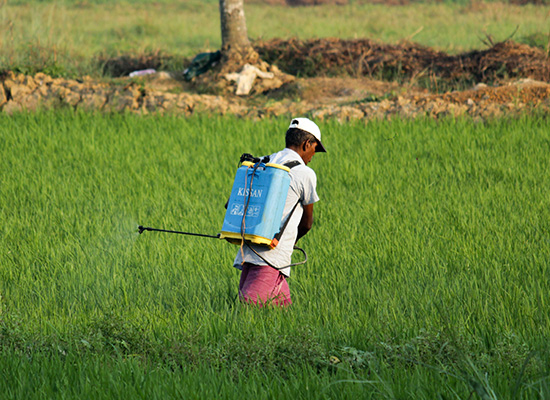Here in India, we’re proud to be one of the world’s biggest agricultural nations. In fact, we stand second in the world in terms of agricultural output. However, we all know that not all farms are created the same. For example, some farms use pesticides, and some do not.
A lot of consumers may be wondering why they should care about this, and whether it really matters. Well, it does, and in this post, we’ll explain the reasons why.
Here at OMKITCHEN, we pride ourselves on organic food that’s free of pesticides. One of the reasons why is because we recognize just how important this is for our customers’ health.
With that in mind, continue reading to find out more about pesticides and the health risks associated with them.
What are Pesticides?
A pesticide is a chemical substance that’s used to destroy insects or other organisms that can harm animals and/or cultivated plants.
When farmers use pesticides, they’re often trying to get rid of rodents, bacteria, fungi, weeds, and insects. While this may be a good thing, there’s a bad side, which isn’t discussed enough.
Pesticides can cause harm to human health.
They can also impact the environment, especially when used in excessive amounts or incorrectly.
Pesticides: A Double-Edged Sword
There are a number of ways that pesticides can enter the body and cause a risk to your health. This includes inhalation, ingestion, and skin absorption.
In fact, it has been estimated by the World Health Organization that there are around 3 million cases of pesticide poisoning per year.

Some of The Health Effects People Can Experience
People can experience both short-term and long-term effects due to pesticide exposure.
Short-Term Symptoms Can Include:
- Diarrhoea
- Dizziness
- Nausea
- Blindness
- Blisters
- Rashes
- Stinging eyes
Long-Term Symptoms Can Include:
- Disruption of the endocrine system
- Neurological and developmental toxicity
- Reproductive harm
- Birth defects
- Cancer
- Immunotoxicity
In severe, rare cases, pesticides can even cause death.
Cases in India That Show How Dangerous Pesticides Are
There have been a number of examples here in India that have caused people to take notice.
A prime example is when Endosulfan, a very toxic pesticide, was sprayed over cashew plantations in Kerala for two decades. This happened until 2011.
Endosulfan ended up contaminating water, soil, and air in the location. Local people suffered a whole host of health problems as a consequence, from congenital anomalies to cancer.
More recently, there was a study carried out in 2018 in Punjab, which we, of course, affectionately call India's 'grain bowl.’
This study revealed that there was a lot of pesticide residue found in the blood samples of local residents, with experts feeling there could be a link between this and the region’s high number of cancer cases.
How Many Pesticides Do Humans Consume?
As you can see, the impact of pesticides is very worrying. Despite this, a lot of farmers and food companies continue to use them. So, how much are we consuming as humans?
Well, it’s impossible to say. There are various factors at play. This includes your own individual habits, food sources, and your dietary choices.
Don’t forget, though, pesticides can enter the body in various ways, which is why we advocate not using pesticides at all!
The World Health Organization has been incredibly vocal as well. They set the ADI for pesticides, which stands for Acceptable Daily Intake. This is the amount of pesticides they feel it’s safe to consume without any serious health risks. Food agencies and regulatory agencies around the world use the WHO’s ADI then to set maximum residue limits for pesticides in food production.
Regulations In India Regarding The Use Of Pesticides
Here in India, we have a number of different regulations about pesticide use. The Central Insecticides Board and Registration Committee (CIBRC) is the chief regulatory body.
The CIBRC operates under the Ministry of Agriculture and Farmers Welfare. It has the responsibility of registering, regulating, and licensing pesticides in India. Aside from this, the main piece of legislation is the 1968 Insecticides Act. This law outlines the rules that must be followed when registering, manufacturing, importing, selling, distributing, and using pesticides in India.
Benefits of Eating Food Produced Without Pesticides
Now that you know the risks that are associated with eating food that’s produced with the help of pesticides, let’s look at what you can expect if you follow a healthy diet that doesn’t involve food that’s manufactured with these chemicals.
- Lower Your Exposure to Pesticide Residues - There’s only one place to begin, and this is with the fact that there’s going to be less pesticide residue in your food. After all, if the food isn’t created with chemicals, there’s a much lower chance of any residue getting into your delicious produce, right? And, we’ve already listed the harm that pesticide residue can cause.
- Play a Role in Protecting The Environment - Organic farming helps to preserve the beautiful world around us. It’s imperative in terms of promoting biodiversity and ecological balance. If we all use fewer synthetic pesticides, we can reduce the impact on the wildlife, water, and soil around us.
- Enjoy Food with More Nutritional Value - There have been a number of studies that have shown that organic grains, vegetables, and fruits can have higher nutrient content. This means more antioxidants, magnesium, iron, and vitamin C - all of the good things for your diet! Of course, research is still ongoing in this area, but the initial signs are promising.
- Give Your Support to Sustainable Agriculture and Help India Thrive - Organic farming methods involve natural pest control, crop rotation, and boosting soil health. If you play a role in supporting and promoting these methods, you’re doing your bit to promote long-term agricultural sustainability here in India, which is so important for our wonderful country.
- Notice the Difference in Taste - Last but not least, a lot of people have noted that organic food offers much better taste when compared with food that’s conventionally grown. Of course, taste is personal. What you find tasty, someone else may not enjoy. However, generally speaking, organic food is much tastier.
Final Thoughts
This is why it makes sense to go down the organic route. You can be sure of responsible, fresh, and healthy food at OMKITCHEN. Please contact us today for authentic, natural, homestyle organic meals/food in Noida & Delhi.

